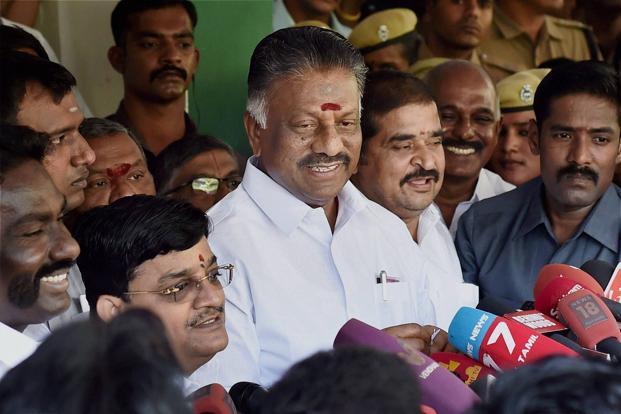
Tamil Nadu's interim budget: Big promises, unwanted projects
The budget indicated that the state’s fiscal deficit is expected to be 4.99 per cent and debt, currently at ₹4.85 trillion, will balloon to ₹5.7 trillion. Revenue has been projected at ₹1,80,700.62 crore

With assembly elections only two months away, the Tamil Nadu government presented its interim budget for 2021-22 on Tuesday.
It was Deputy Chief Minister and Finance Minister O Panneerselvam’s 11th budget under an AIADMK government. Ahead of his speech, the opposition staged a walkout.
During his introductory remarks, OPS said the government had spent ₹13,352 crore on COVID-19 relief work, and that the pandemic had had a big impact on the budget.
The budget indicated that the state’s fiscal deficit is expected to be 4.99 per cent and debt, currently at ₹4.85 trillion, would balloon to ₹5.7 trillion. Revenue has been projected at ₹1,80,700.62 crore.
Also read: Tamil Nadu bagged highest allocation for COVID-19 battle
At a press conference, Finance Secretary S Krishnan said although revenues have declined, the government has taken measures to tackle the pandemic. Under the fiscal responsibility act, states are mandated to keep their fiscal deficit under 3 per cent of their respective GDP; this has been relaxed to 5 per cent due to Covid, he said.
“The state has performed well in keeping the borrowings under the limit. In the next fiscal year, the limit will be reduced to 4 per cent,” he said. “Keeping that in mind, we have allocated funds for existing schemes without levying any new taxes.”
Key Takeaways
- The health sector, understandably given the pandemic, received a big push. It was allocated ₹19,420 crore.
- Amma Mini Clinics, launched in December last year to provide essential healthcare services to the poor, was allocated ₹144 crore.
- ₹5,478 crore was allocated for higher education. School education sector was allocated ₹34,181 crore.
- The agricultural sector received ₹1,738 crore. An additional ₹5,000 crore was allocated towards crop loan waiver. Relief provided for loss of paddy due to natural disasters was hiked from ₹13,000 per hectare to ₹20,000 per hectare.
- The Tamil Nadu police department received ₹9,567 crore.
- ₹1,953.98 crore was allocated for nutrition programme.
- ₹1,700 crore was allocated towards special schemes for the disabled.
- A new accident and health insurance scheme that will benefit 55.67 lack families below poverty line. Under the scheme if the head of a family dies a natural death, the family gets ₹2 lakh; if s/he dies in an accident, the kin get ₹4 lakh.
Opposition Takes Aim
The opposition criticised the government and said it would not be able to meet its promises.
“State borrowings have mostly been utilised to finance salary, interest and pension payments. When that is the case, how can they make such promises and announcements?” DMK MLA P Thiagarajan said.
“The opposition raised this issue in assembly on many occasions. This was also pointed out in the 15th Finance Commission report. Amid an economic crisis, the government’s electoral campaign ‘Vetrinadai Podum Tamizhagam’ is nothing but a farce.”
Criticism from Doctors’ Association
To intensify its battle against the pandemic, the government allocated ₹19,420 crore to the health department. The newly launched ‘Amma Mini Clinics’ got ₹144 crore.
However, the Doctors’ Association for Social Equality called it an election stunt.
“The concept of mini clinics was launched with the election in mind. It still has not got a foothold in the ground,” said Dr GR Ravindranath, general secretary of the association. “The building of the inaugural clinic collapsed, the doctors deployed in the clinics are working under contract. Other problems persist,” he said.
While welcoming the new insurance scheme, Ravindranath said the existing health insurance schemes need more changes.
“Even in government hospitals, only if a patient has insurance, major surgeries are performed. Patients should be able to visit private hospitals if government hospitals lack a particular treatment or facility. Whereas in government hospitals, they should provide the treatments free of cost. The government should create a separate fund, similar to the Chief Minister’s Relief Fund, to make the insurance scheme efficient,” added Ravindranath.
A Complete Waste of Money
In order to attract voters in the Kongu Belt, an AIADMK stronghold, the government announced a metro project in Coimbatore to be built at a cost of ₹6,683 crore.
However, a political commentator said the city does not need a metro. “It is surprising to hear that the city is to have metro rail,” said Pongalur Manikandan.
“There is not much traffic in the city compared to Chennai. Besides, there is no land available to carry out the project. It’s going to be a complete waste of money. The project was announced just to show that EPS (Edappadi K Palaniswami, the chief minister) did something to Coimbatore.”
“Instead of spending so many crores on metro, they can spend just half of the allocation on widening roads, constructing elevated roads, etc, which is the need of the city,” Manikandan added.
Unachieved Vision
Questioning the track record of the ruling party, Thiagarajan said the government has not even achieved 50 per cent of the objectives listed in the ‘Vision 2023’ plan.
“A person who doesn’t have money can say or announce anything. A poor man can sit in a hut and still can claim that he is the wealthiest king. A small child can say that he or she is a doctor. But the reality is different. Do you have any records to prove your claims? The difference between the achievements made by this government in the last 10 years and the announcement it is making now is wider,” he said.
During AIADMK’s 10-year rule, the state’s revenue has been decimated and has resulted in increased debt accumulation, Thiagarajan had tweeted earlier.

